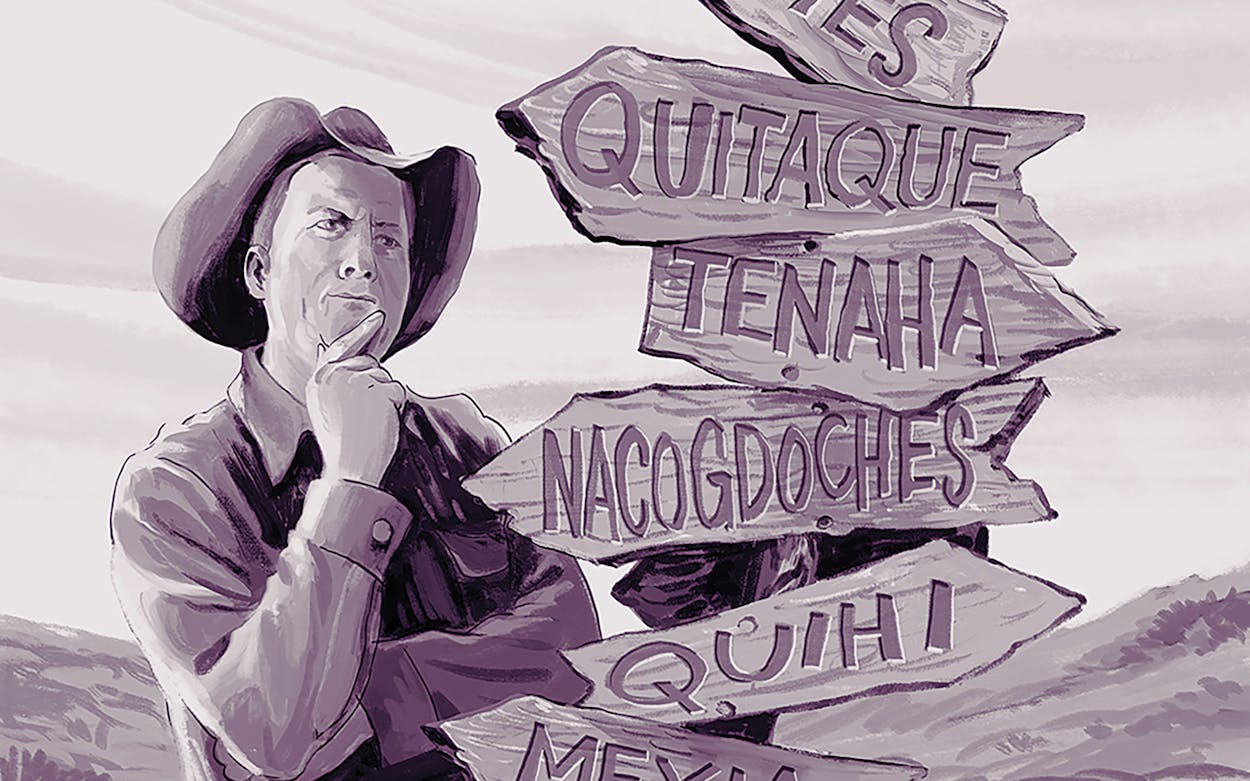Q: On the way to Caprock Canyons State Park, my wife and I drove through Quitaque. We weren’t sure how to pronounce the town’s name. Kit-A-Q? Quit-A-Kay? Qui-take? K-TAKEY? Finally, a park ranger told me it’s KITTY-kway. How many other towns in our great state have unusual names that are open to multiple plausible pronunciations?
John Thomas, Dallas
A: The rich geographic tapestry of Texas is, upon close inspection, a weave of approximately one bajillion tiny little towns, a whole bunch of midsize cities, and a few immense metropolises. Among all these many, many locales—the large ones and the small ones and the in-between ones—there are no less than a whole buttload that are possessed of names whose accepted pronunciations a stranger could understandably rassle with for a considerable amount of time. Quitaque is a perfect example.
And so are Addielou (AD-uh-loo), Anahuac (AN-nuh-whack), Arneckeville (ARE-nicky-vill), Balmorhea (bal-muh-RAY), Boerne (BURN-e), Buda (BYOO-duh), Cuthand (CUT-hand), Danevang (DAN-uh-vang), Edom (E-d’m), Fieldton (FEEL-t’n), Gruene (green), Helotes (hell-Oh-tis), Iraan (ira-ANN), Jiba (HE-buh), Kosciusko (kuh-SHOES-co), Leakey (LAY-key), Marathon (MARE-th’n), Nacogdoches (nack-uh-doh-CHISS), Oenaville (oh-WEEN-uh-v’l), Palacios (PUH-lash-us), Quihi (KWEE-he), Refugio (reh-FYOOR-ee-oh), Study Butte (stoody-BYOOT), Tenaha (TEN-uh-haw), Uhland (YOU-l’nd), Vidor (VI-der), Waxahachie (wahks-uh-HATCH-ee), Ysleta (is-LET-uh), and Zuehl (ZEE-uhl).
And then there are all those familiar place names that aren’t necessarily difficult to pronounce but whose highway signs can induce a double take. To mention just a few, in no particular order, there’s Ding Dong, Dime Box, Cut and Shoot, Gun Barrel City, Gunsight, Point Blank, Kermit, Loco, Notrees, Telephone, Best, Cool, Smiley, Sweet Home, Grit, Bacon, Oatmeal, Raisin, Coffee City, Noodle, Joy, Uncertain, North Zulch, Zipperlandville, Jot ’Em Down, Wink, Fink, Bug Tussle, and Turkey. And Lazbuddie. And Nimrod. And way too many more to keep going in this limited space.
Semi-relatedly, there are a number of Texas places or geographic features with names so offensive—most contained the word “Negro”—that sixteen of them have been recently reconsidered, stricken, and changed by the U.S. Board on Geographic Names, after a request to do so was made by a unanimous Texas Legislature, as was noted in this very publication a short time ago.
The Texanist is, among other things, a reasonably trusty source when it comes to such things as the proper pronunciations of peculiarly named Texas places. But as much as folks like to believe that he was either born with this gift or supernaturally endowed with it, this is not the case. The simple fact of the matter is, the Texanist, as a Texas boy, just happens to have a fair amount of experience with such matters. In the case of Quitaque, for example, some of the Texanist’s older brother’s in-laws happen to hail from the Quitaque area, and the Texanist encountered it and its correct pronunciation a long, long time ago. But the Texanist is a humble man and will be the first to admit that he doesn’t, in fact, know it all. The second to admit it, by the way, would probably be the Texanist’s teenage daughter, and then the third to admit it would be that sweet-yet-occasionally-surprisingly-salty young lady’s mother, Mrs. Texanist. But the Texanist digresses.
The point is, it’s very unlikely that any one person, be they Texanist or lesser mortal, will know it all when it comes to the accepted pronunciations of the many obscure Texas towns with tricky-to-phonate names. Thus, one must rely on the aid of a reliable source, just as you have, Mr. Thomas, by darkening the door of the Texanist’s email inbox.
One such source that the Texanist himself relies on, in addition to his handy quiver of mnemonic devices—it’s Burnet, durn it, can’t you learn it—is the exhaustive research of Paducah-born George Mitchel Stokes, a noted authority on this very subject.
In the 1940s, Stokes, a graduate student at Baylor University who would go on to be the long-serving director of the speech division in that institution’s communications department (and who was known as the “Voice of Baylor,” thanks to his 26-year stint on the PA at Baylor Stadium), compiled a list of pronunciations for nearly two and a half thousand Texas place names. A good portion of Stokes’s helpful reference guide has been reprinted by the fine folks at the Texas Almanac and is available for online perusal, which the Texanist sometimes does when he finds himself with a little time to kill. The Texanist also keeps a printed copy in his glove box and suggests that any curious Texas traveler do the same. After all, from AN-dis (Andice) to the abovementioned ZEE-uhl (Zuehl), you never know where the Texas blacktop is going to lead you—or when you’re going to need help pronouncing that location’s name.
As interesting as the pronunciations may be, though, knowing from whence, exactly, these places take their strange names can be equally stimulating. Many are Spanish in origin (often with badly butchered pronunciations), some are Germanic, some are Czech, some are named in honor of our Texas forebears, some are cryptic, and some are just downright silly. Did you know that the name Balmorhea is derived from the surnames of three land developers, Balcum, Morrow, and Rhea? Or that Waxahachie reportedly comes from a Native word for buffalo? Or that the origins of the name Dallas are a total mystery? Or that Iraan is not a misspelling of the name of the Middle Eastern country that is always in the news, but is, instead, a portmanteau of the first names of Ira and Ann Yates, the enterprising ranch owners upon whose land much of the West Texas oil boomtown was built? Quitaque, by the way, was said to have been named in the 1880s by famed rancher and trailblazer Charles Goodnight, who owned a spread in the area at the time. Goodnight, it’s said, understood the word “quitaque” to be a Native American word for “end of the trail,” though it is also said that the actual meaning of the word is “horse manure” and that Quitaque is named for a pair of area buttes that resemble two large piles of the stuff.
The Texanist could go on and on, but he’s got a lunch date in Dumas (DOO-muss) he doesn’t want to miss, followed by an appointment in Floydada (floy-DAY-duh) concerning this year’s pumpkin patch (Floydada, by the way, has the distinction of being known as Pumpkin Capital, USA), and then he was hoping to swing by Veribest (VER-ih-best) to see what the big deal is about this tiny little town that is said to have been named after a brand of bread, or mayonnaise, or possibly even canned ox tongue. So, in closing, let him just say that this has been one heck of an enjoyable exercise in orthoepy. Thanks for the letter!
Have a question for the Texanist? He’s always available here. Be sure to tell him where you’re from.
- More About:
- The Texanist









